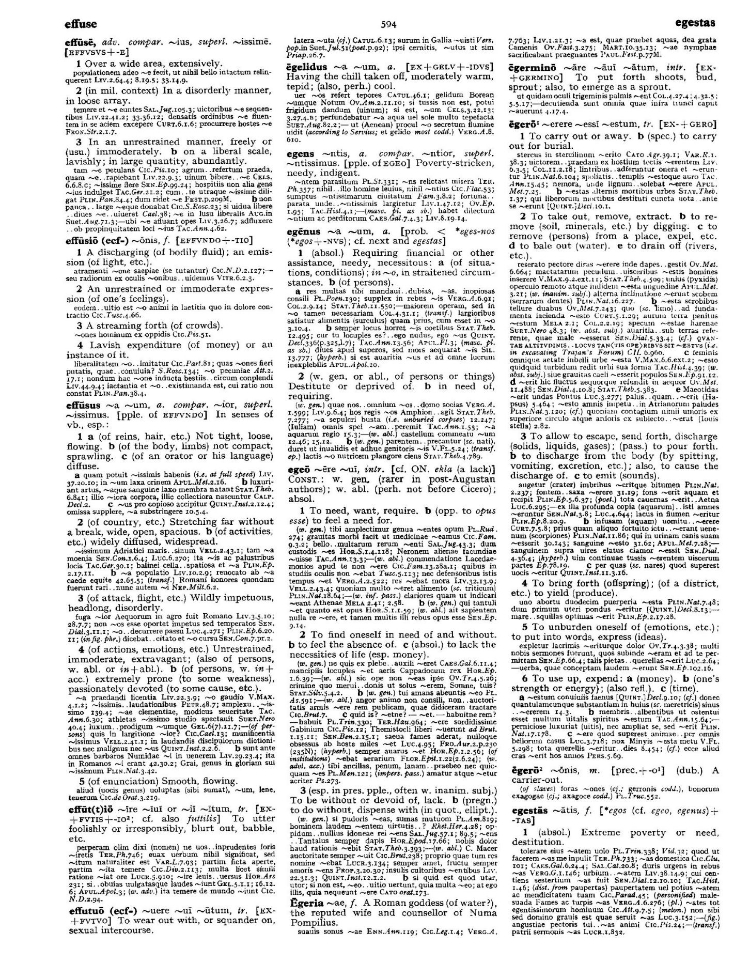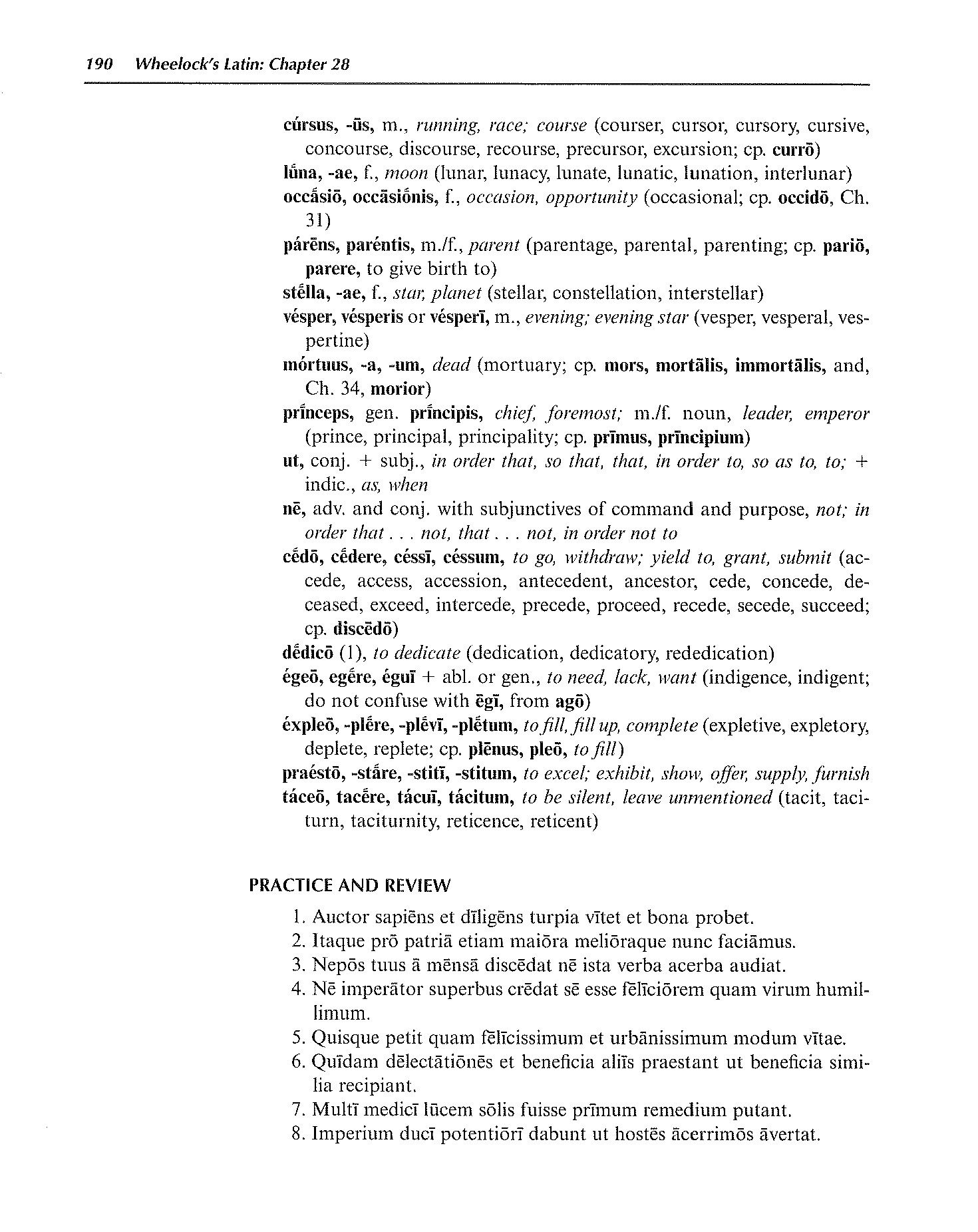
page_listing.tpl
page_subListingDetails.tpl
sub_listingDetails_style1.tpl
sub_listingDetails.title.tpl
egēre to need
egēre is a Latin Verb that primarily means to need.
Definitions for egēre
Wheelock's Latin
Verb
- 1
+abl. or gen., to need, lack, want
- 2
do not confuse with ēgī, from agō
English derivatives:
indigence indigent
Oxford Latin Dictionary
Verb
- 1
To need, want, require. (b) (opp. to opus esse) to feel a need for.
- 2
To find oneself in need of and without. (b) to feel the absence of. (c) (absol.) to lack the necessities of life (esp. money).
- 3
(esp. in pres. pple., often w. inanim. subj.) To be without or devoid of, lack. (b) (pregn.) to do without, dispense with (in quot., ellipt.).
Sentences with egēre
Latin to English
Hominis est enim adfici dolore, sentire, resistere tamen et solacia admittere, non solaciis non egere.Compare For it is the very essence of human nature to feel those impressions of sorrow, which it yet endeavors to resist, and to admit, not to be above, consolation.
Neque confirmatio noster egeo virtus tuus.Compare Neither did your virtue need to be strengthened by me.
Auxilium satis superque habeo; sed qui multus sum, multus res egeo.Compare I have enough and too many allies; but the more numerous we are, the more things shall we require.
Conjugation table for egēre
Cactus2000
| ACTIVE | |
| Indicative present | Indicative imperfect |
| egeō egēs eget egēmus egētis egent | egēbam egēbās egēbat egēbāmus egēbātis egēbant |
| Indicative perfect | Indicative pluperfect |
| eguī eguistī eguit eguimus eguistis eguērunt / eguēre | egueram eguerās eguerat eguerāmus eguerātis eguerant |
| Indicative future | Indicative future perfect |
| egēbō egēbis egēbit egēbimus egēbitis egēbunt | eguerō egueris eguerit eguerimus egueritis eguerint |
| Subjunctive present | Subjunctive imperfect |
| egeam egeās egeat egeāmus egeātis egeant | egērem egērēs egēret egērēmus egērētis egērent |
| Subjunctive perfect | Subjunctive pluperfect |
| eguerim egueris eguerit eguerimus egueritis eguerint | eguissem eguissēs eguisset eguissēmus eguissētis eguissent |
Infinitive present egēre Infinitive perfect eguisse Infinitive future - | Imperative present egē egēte Imperative future egētō egētō egētōte egentō |
| PARTICIPLE | ||
| Participle present active | ||
| egēns | egentēs | |
| egēns | egentēs | |
| egēns | egentēs | |
| egēns | egentēs | |
| egēns | egentēs | |
| Participle future active | ||
| - | - | |
| - | - | |
| - | - | |
| - | - | |
| - | - | |
| Participle perfect passive | ||
| - | - | |
| - | - | |
| - | - | |
| - | - | |
| - | - | |
| Gerundive | ||
| egendus | egendī | |
| egendus | egendī | |
| egendus | egendī | |
| egendus | egendī | |
| egendus | egendī | |
| Gerund | Supine | |
| egēre | - | |
| egēre | - | |
| egēre | ||
| egēre | ||
| egēre | ||
| PARTICIPLE | ||
| Participle present active | ||
| Nom. | egēns | egentēs |
| Gen. | egentis | egentium |
| Dat. | egentī | egentibus |
| Acc. | egentem | egentēs |
| Abl. | egente | egentibus |
| Participle future active | ||
| Nom. | - | - |
| Gen. | - | - |
| Dat. | - | - |
| Acc. | - | - |
| Abl. | - | - |
| Participle perfect passive | ||
| Nom. | - | - |
| Gen. | - | - |
| Dat. | - | - |
| Acc. | - | - |
| Abl. | - | - |
| Gerundive | ||
| Nom. | egendus | egendī |
| Gen. | egendī | egendōrum |
| Dat. | egendō | egendīs |
| Acc. | egendum | egendōs |
| Abl. | egendō | egendīs |
| Gerund | Supine | |
| Nom. | egēre | - |
| Gen. | egendī | - |
| Dat. | egendō | |
| Acc. | egendum | |
| Abl. | egendō | |
Data sources
Notes
- Definitions
- Frederick M. Wheelock, Wheelock's Latin, 6th ed., rev. Richard A. LaFleur (New York, NY: HarperCollins Publishers, 2005): 190.
- P. G. W. Glare, Oxford Latin Dictionary, Vols. 1-8 (Oxford: Clarendon Press, 1982): 594.
- Word frequencies
- Paul B. Diederich, The Frequency of Latin Words and Their Endings, PhD diss., (Columbia University, 1939).
Bibliography
Allen, Joseph H. Allen and Greenough's New Latin Grammar for Schools and Colleges: Founded on Comparative Grammar. Edited by James B. Greenough, George L. Kittredge, Albert A. Howard, and Benjamin L. D'Ooge. Boston, MA: Ginn & Company, 1903.
Crystal, David. A Dictionary of Linguistics and Phonetics. 6th ed. Oxford, UK: Blackwell Publishing, 2008.
Delatte, Louis, Suzanne Govaerts, Joseph Denooz, and Etienne Evrard. Dictionnaire fréquentiel et index inverse de la langue latine [Frequency Dictionary and Inverse Index of the Latin Language]. Liège, Belgium: Laboratoire d'analyse statistique des langues anciennes de l'Université de Liège (L.A.S.L.A.), 1981.
Diederich, Paul B. The Frequency of Latin Words and Their Endings. PhD diss., Columbia University, 1939.
Francese, Christopher. "Latin Core Vocabulary." Dickinson College Commentaries. Last modified 2014. http://dcc.dickinson.edu/latin-vocabulary-list.
Gildersleeve, Basil L., and Gonzales Lodge. Gildersleeve's Latin Grammar: Third Edition, Revised, and Enlarged. 3rd ed. London, England: Macmillan and Co., 1903.
Glare, Peter G.W. Oxford Latin Dictionary. Vols. 1-8. Oxford, England: Clarendon Press, 1982.
Krüger, Bernd. "Latin Conjugation Tables." Cactus2000. Accessed May 5, 2023. https://latin.cactus2000.de/index.en.php.
Pierson, Nick. "Sound of Text." Accessed October 26, 2019. https://soundoftext.com.
Wheelock, Frederick M. Wheelock's Latin. 6th ed. Revised by Richard A. LaFleur. New York, NY: HarperCollins Publishers, 2005.
Wiktionary Contributors. "Victionarium." Wikimedia Foundation, Inc. Updated March 18, 2019. https://la.wiktionary.org/wiki/Victionarium:Pagina_prima.
Citation
Chicago (17th ed.)
Allo Contributors. "egeō, egēre, eguī (v.) - Latin Word Definition." Allo Latin Dictionary. Last modified . Accessed February 19, 2026. http://ancientlanguages.org/latin/dictionary/egeo-egere-egui.
Entry created on . Last updated on .







